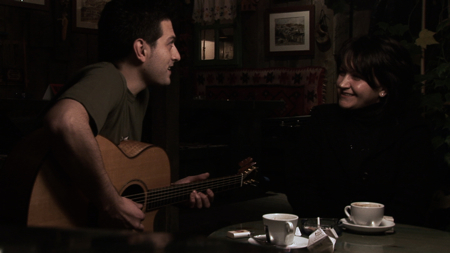By Joe Bendel. After Danis Tanović’s No Man’s Land won the 2002 Academy Award for Best Foreign Language Film and Jasmila Žbanić’s Grbavica captured the Golden Bear at the 2006 Berlin Film Festival, serious fest watchers had to take Bosnia’s small but accomplished film industry seriously. Unlike most former captive nations, recent Bosnian films have been less likely to address the Soviet experience, instead focusing on the 1994 war. Those ghosts could again be seen in the selections of the Seventh Annual Bosnian-Herzegovinian Film Festival, which is perhaps ironically one of the friendliest fests in New York.
Indeed, the war loomed large in all three programming blocks of three features preceded by a number of shorts. Though already available on DVD (and streaming on Netflix), Hans-Christian Schmid’s Storm (trailer above) would probably be of the most interest to Libertas readers, given its cynical view of the International Criminal Court – portrayed as a typical government office, full of petty corruption and bloated egos. Struggling to prosecute a Bosnian Serb accused of war crimes, Hannah Maynard’s case is in danger of imminent collapse unless she can convince a reluctant witness to come forward. Her serpentine boss, a master at navigating the Court’s roiling bureaucratic waters, backs her efforts, but only so far.
Storm is a German-Danish-Dutch co-production directed by a German starring a Romanian actress as a Bosnian, but its lingua franca is English, with some subtitled German, Bosnian, and Serbian thrown in for good measure. It might be an international affair, but it hardly engenders confidence in aspiring world-governing bodies like the international court. The performances though, especially Romanian Anamaria Marinca and the jowly Rolf Lassgård as Maynard’s world weary Swedish lover, are quite impressive. Political but genuinely nuanced, Storm is an intriguing film worth checking out (despite a Hollywood-style ending that seems at odds with the rest of the film).

A meditation of Sevdalinka, the Bosnian blues, Marina Andree’s Sevdah is also haunted by the war. Representing a culture under siege for Bosnians exiled during the war, the documentary captures the beautiful melancholy of the music. Particularly memorable were a Sendalinka rendition of Gershwin’s “Summertime” and a Delta Blues take on a Sevdalinka standard.
Easily the oddest selection of this or any year’s BHFF was Geoffrey Alan Rhodes and Steven Eastwood’s Buried Land, which recently had its world premiere at Tribeca. Incorporating elements of fictionalized documentary, mockumentary, and performance art video, Land ostensibly documents a film crew shooting a film about the Visoko Pyramids, which may or may not be monuments of an ancient civilization predating the Egyptian pyramids (most experts seem to be skeptical).
In Rhodes and Eastwood’s film, most of the local Bosnians embrace the pyramids as a positive development for their country following the horrors of war. However, they are skeptical of the film crew, fearing they will try to give them the “Borat” treatment — concerns that soon appear to be justified. [Thanks for giving us a bad name, Hollywood and Sacha Baron Cohen.] It is hard to judge, but Land could well be an ironic statement on either provincial gullibility or media cynicism (or both). It is a strange hybrid, but the scenery is striking. Defying easy classification and description, Land is a film for those who appreciate cleverness more than emotional engagement in cinema. It definitely made for a diverse slate at this year’s BHFF.
BHFF might be one of the smaller New York fest (for now), but it always has something good to cover. Usually coming hard on the heels of Tribeca, it is worth sticking around New York for.
Thanks for the article. It was a fun weekend. As JB points out, there is always something good to see, and this year was no different.